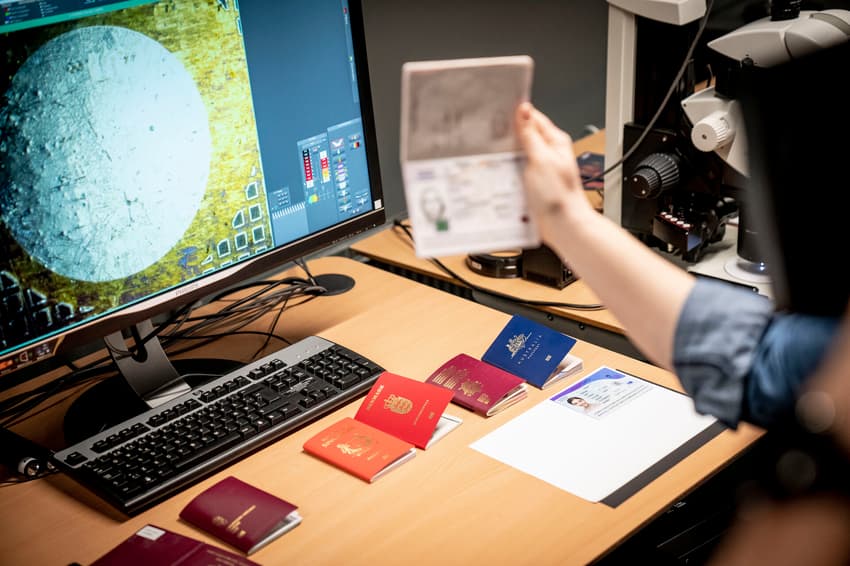'We are 10-15 years behind': Swedish PM praises strict Danish immigration

Sweden's Prime Minister Ulf Kristersson praised Denmark for pioneering stricter immigration policies on Tuesday as he visited the agency responsible for sending refugees back to their home countries.
Kristersson met Danish counterpart Mette Frederiksen during a visit to Hjemrejsestyrelsen (Danish Return Agency), which is responsible for sending refugees back to their home countries if Denmark withdraws their asylum status or if they choose to leave.
Sweden has long been known to have a more accommodating stance on refugees and asylum than Denmark, but Stockholm has hardened its policies considerably since a right-wing government came to power last year with the backing of the nationalist party Sweden Democrats.
Frederiksen said she was “pleased that Denmark, after 20 years of strict immigration policies, can inspire other [countries]” in a press briefing after meeting with Kristersson.
The two government leaders discussed gang crime as well as immigration, the Danish PM said.
“What we are doing now is what Denmark began doing 10-15 years ago. It’s necessary, it’s possible, but it will take time,” Kristersson said at a press conference held after the visit at Marienborg, the Danish prime minister’s official residence near Copenhagen.
Kristersson's visit to the Return Agency is highly symbolic, given that in the Tidö Agreement the three parties in his government signed with the Sweden Democrats, there are plans to look into withdrawing residency from asylum seekers, or those with "alternative protection", "if the original grounds for asylum no longer apply, for instance if a conflict has ended".
That policy would echo Denmark’s “paradigm shift” of 2019 in which the government made it official policy that all asylum seekers have temporary status in principle.
The Danish policy has led to immigration authorities withdrawing residence permits from scores of Syrian refugees from Damascus and its surrounding provinces, at odds with expert opinion and most EU countries’ position on the safety of the Syrian region for repatriation.
Sweden’s Tidö agreement also calls for an inquiry to be set up which will look into whether asylum seekers could be held in transit centres while their asylum applications are being handled, and analyse whether such centres are possible under European Convention on Human Rights or the Swedish Constitution.
The inquiry will consider where such transit centres could be established and whose control they would need to be under, a question that is relevant in Denmark, where the government is working to push for an EU agreement which would allow such asylum processing centres to be established outside of the EU.
Comments
See Also
Kristersson met Danish counterpart Mette Frederiksen during a visit to Hjemrejsestyrelsen (Danish Return Agency), which is responsible for sending refugees back to their home countries if Denmark withdraws their asylum status or if they choose to leave.
Sweden has long been known to have a more accommodating stance on refugees and asylum than Denmark, but Stockholm has hardened its policies considerably since a right-wing government came to power last year with the backing of the nationalist party Sweden Democrats.
Frederiksen said she was “pleased that Denmark, after 20 years of strict immigration policies, can inspire other [countries]” in a press briefing after meeting with Kristersson.
The two government leaders discussed gang crime as well as immigration, the Danish PM said.
“What we are doing now is what Denmark began doing 10-15 years ago. It’s necessary, it’s possible, but it will take time,” Kristersson said at a press conference held after the visit at Marienborg, the Danish prime minister’s official residence near Copenhagen.
Kristersson's visit to the Return Agency is highly symbolic, given that in the Tidö Agreement the three parties in his government signed with the Sweden Democrats, there are plans to look into withdrawing residency from asylum seekers, or those with "alternative protection", "if the original grounds for asylum no longer apply, for instance if a conflict has ended".
That policy would echo Denmark’s “paradigm shift” of 2019 in which the government made it official policy that all asylum seekers have temporary status in principle.
The Danish policy has led to immigration authorities withdrawing residence permits from scores of Syrian refugees from Damascus and its surrounding provinces, at odds with expert opinion and most EU countries’ position on the safety of the Syrian region for repatriation.
Sweden’s Tidö agreement also calls for an inquiry to be set up which will look into whether asylum seekers could be held in transit centres while their asylum applications are being handled, and analyse whether such centres are possible under European Convention on Human Rights or the Swedish Constitution.
The inquiry will consider where such transit centres could be established and whose control they would need to be under, a question that is relevant in Denmark, where the government is working to push for an EU agreement which would allow such asylum processing centres to be established outside of the EU.
Join the conversation in our comments section below. Share your own views and experience and if you have a question or suggestion for our journalists then email us at [email protected].
Please keep comments civil, constructive and on topic – and make sure to read our terms of use before getting involved.
Please log in here to leave a comment.